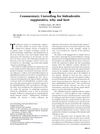 11 citations,
July 2003 in “The Nurse practitioner”
11 citations,
July 2003 in “The Nurse practitioner” New treatments for PCOS focus on managing symptoms and improving fertility.
 179 citations,
March 2005 in “British Journal of Dermatology”
179 citations,
March 2005 in “British Journal of Dermatology” Oral antiandrogens effectively treat female hair loss, with better results in higher hair loss grades.
 30 citations,
December 1999 in “Journal of Investigative Dermatology Symposium Proceedings”
30 citations,
December 1999 in “Journal of Investigative Dermatology Symposium Proceedings” Steroids, particularly estrogens and 5α-reductase inhibitors, affect blood vessel-related hair growth processes in hair follicle cells.
 14 citations,
April 2006 in “Expert Review of Dermatology”
14 citations,
April 2006 in “Expert Review of Dermatology” Antiandrogen therapy helps treat genetic hair loss.
 11 citations,
July 2019 in “The Journal of Sexual Medicine”
11 citations,
July 2019 in “The Journal of Sexual Medicine” Spironolactone might cause painful intercourse and decreased sexual arousal in women.
1 citations,
January 2020 in “Bioscientia medicina” Female pattern hair loss is common, worsens with age, and requires long-term treatment to manage.
 10 citations,
June 2010 in “Expert Opinion on Drug Metabolism & Toxicology”
10 citations,
June 2010 in “Expert Opinion on Drug Metabolism & Toxicology” Finasteride reduces prostate cancer risk but may increase high-grade cancer chances.
 47 citations,
August 2000 in “Endocrine Reviews”
47 citations,
August 2000 in “Endocrine Reviews” The document concludes that more research is needed to understand excessive hair growth in women with normal hormone levels and regular ovulation.
 March 2012 in “Hair transplant forum international”
March 2012 in “Hair transplant forum international” Environmental factors and chemicals might affect hormone balance and contribute to common hair loss.
1 citations,
March 2022 in “Irish Journal of Medical Science” Men with androgenetic alopecia and hypertension may experience more severe COVID-19.
 November 2017 in “JAMA internal medicine”
November 2017 in “JAMA internal medicine” Women also use 5α-reductase inhibitors, and their effects differ from men.
 23 citations,
January 1994 in “Skin Pharmacology and Physiology”
23 citations,
January 1994 in “Skin Pharmacology and Physiology” Hair loss in men and women is linked to high stress hormone levels and other hormonal imbalances, suggesting treatments should be customized to each person's hormones.
 23 citations,
May 1984 in “Journal of the American Geriatrics Society”
23 citations,
May 1984 in “Journal of the American Geriatrics Society” Benign Prostatic Hyperplasia may be caused by changes in how the body processes male hormones.
 18 citations,
April 2016 in “Endocrinology and Metabolism Clinics of North America”
18 citations,
April 2016 in “Endocrinology and Metabolism Clinics of North America” The document concludes that diagnosing PCOS in teenagers is difficult and should focus on specific hormone levels and menstrual irregularities, while also considering treatment for symptoms and related health issues.
46 citations,
April 1982 in “Journal of the American Academy of Dermatology” Isotretinoin shrinks sebaceous glands without affecting hair or skin color, unlike etretinate.
 12 citations,
August 2000 in “Fertility and Sterility”
12 citations,
August 2000 in “Fertility and Sterility” Topical finasteride doesn't reduce DHT levels, hinting at an endocrine role in hair loss.
 May 2019 in “Gastroenterology”
May 2019 in “Gastroenterology” Androgen lowering medications don't significantly change HCV-related liver cancer risk in men.
 November 2018 in “International Journal of Current Pharmaceutical Research”
November 2018 in “International Journal of Current Pharmaceutical Research” PCOS is a hormonal disorder causing symptoms like irregular periods and acne, and increases the risk of diabetes and heart disease.
 25 citations,
January 1998 in “Dermatology”
25 citations,
January 1998 in “Dermatology” Male pattern hair loss negatively affects quality of life, but drug treatments can help.

Neurokinin B levels are higher in the placentas of women with PCOS who have female babies.
1 citations,
January 2007 in “Humana Press eBooks” Effective treatments for excessive body hair in women include drugs that block androgens, sometimes combined with oral contraceptives.
January 2005 in “Elsevier eBooks” Insulin resistance and hyperinsulinism are linked to fertility issues and can worsen symptoms of PCOS.
58 citations,
February 2018 in “Journal of cosmetic dermatology” Estrogen helps keep skin healthy and may make women look younger and more attractive.
 17 citations,
August 2010 in “Journal of the American Academy of Dermatology”
17 citations,
August 2010 in “Journal of the American Academy of Dermatology” Unroofing is an effective, less invasive, and cost-effective surgery for hidradenitis suppurativa with low recurrence and improved patient quality of life.
 23 citations,
January 2021 in “Journal of Dermatological Science”
23 citations,
January 2021 in “Journal of Dermatological Science” The document concludes that we need more research to understand Telogen Effluvium and find effective treatments.
 9 citations,
March 2021 in “Hormones”
9 citations,
March 2021 in “Hormones” COVID-19 may affect male fertility and women might have better outcomes due to hormonal and immune differences.
 8 citations,
July 2012 in “Cambridge University Press eBooks”
8 citations,
July 2012 in “Cambridge University Press eBooks” Androgens can both increase body hair and cause scalp hair loss.
 78 citations,
June 2003 in “Journal of Investigative Dermatology Symposium Proceedings”
78 citations,
June 2003 in “Journal of Investigative Dermatology Symposium Proceedings” TGF-β1 from dermal papilla cells suppresses hair growth, and targeting it may help treat androgenetic alopecia.
 12 citations,
January 2016 in “Journal of Assisted Reproduction and Genetics”
12 citations,
January 2016 in “Journal of Assisted Reproduction and Genetics” Certain gene variations are linked to higher male hormone levels in Chinese women with PCOS and insulin resistance.
 11 citations,
May 2003 in “Obstetrics and gynecology (New York. 1953. Online)/Obstetrics and gynecology”
11 citations,
May 2003 in “Obstetrics and gynecology (New York. 1953. Online)/Obstetrics and gynecology” Hirsutism in women often indicates a hormonal imbalance and can be managed with a combination of hormonal treatments and hair removal methods.
























